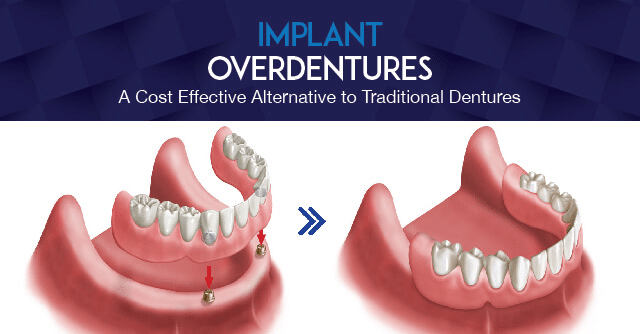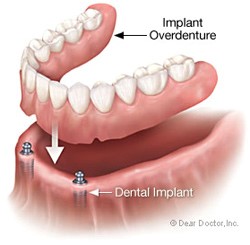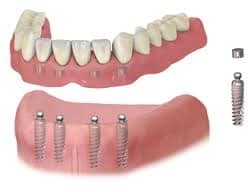Key Takeaways
- Advanced tooth replacement solution: Implant-supported dentures combine the stability of dental implants with the convenience of dentures, offering a permanent solution for multiple missing teeth
- Comprehensive treatment timeline: The complete dental implant treatment process takes 3-9 months, including implant placement and osseointegration healing period
- Superior functionality: These dentures restore natural chewing power and prevent bone loss while maintaining your facial structure
- Personalized care: Candidates need adequate jawbone density and good oral health, with bone grafting available when needed
- Long-term investment: Typically requiring 4-6 dental implants per arch, implant-supported dentures can last a lifetime with proper dental hygiene
Combine Dental Implants and Dentures for a Superior Tooth Replacement with Our Dentist Near You
Are you struggling with loose, uncomfortable traditional dentures that affect your confidence and quality of life? Implant-supported denturesoffer a revolutionary tooth replacement solution that combines cutting-edge dental technology with personalized care. Unlike conventional removable dentures, this advanced dentistry approach provides unmatched stability and restores your natural teeth’s functionality.
Ready to rediscover your beautiful smile? Our experienced dentist in Hilliard, OH, is here to help! Contact our dental office near youtoday at (614) 771-6060. We proudly serve patients from Columbus, Dublin, Upper Arlington, Grove City, Westerville, and surrounding Central Ohio communities with comprehensive dental services.
What Are Implant-Supported Dentures?
Implant-supported denturesrepresent the most advanced solution for patients with multiple missing teeth or an entire arch of lost teeth. This innovative dental implanttreatment anchors your replacement teeth to titanium implant posts surgically placed in your jawbone, creating a permanent solution that functions like your natural teeth.
Unlike traditional dentures that rely on adhesives and rest on your gums, implant-supported dentures integrate with your jawbone through osseointegration, providing exceptional stability and comfort that allows you to eat, speak, and smile with complete confidence.
Types of Implant-Supported Dentures
- Fixed Implant-Supported Dentures (Permanent Solution): These dentures are permanently attached to dental implants and can only be removed by your dentist during professional cleaning appointments. They’re ideal for patients seeking a long-term, low-maintenance tooth replacement option that feels and functions like natural teeth.
- Removable Implant-Supported Dentures (Snap-On): These dentures can be removed for thorough cleaning but snap securely onto the implant posts when worn. This option offers flexibility while providing excellent stability compared to traditional removable dentures.
Why Choose Implant-Supported Dentures? Benefits for Your Oral Health
Unmatched Stability and Enhanced Comfort
Because they’re anchored to dental implants, these dentures won’t slip or shift, even when enjoying tough foods like steak or fresh apples. This remarkable stability eliminates the discomfort and embarrassment often associated with loose traditional dentures, allowing you to feel comfortable in social situations.
Restored Chewing Power and Improved Speech
Implant-supported denturesrestore up to 90% of your natural chewing power, allowing you to enjoy your favorite foods without dietary restrictions. They also dramatically improve speech clarity, as there’s no risk of dentures slipping while talking—a common concern with conventional dentures.
Jawbone Preservation and Facial Structure Support
When you lose natural teeth, your jawbone begins to deteriorate over time due to a lack of stimulation. Dental implants act like natural tooth roots, stimulating the jawbone and preventing bone loss. This crucial benefit maintains your facial structure and helps you avoid the sunken appearance often seen with traditional dentures.
Long-Lasting Durability and Cost-Effectiveness
With proper oral health care and regular visits to your dental hygienist, implant-supported dentures can last 15-20 years or more. Dental implants themselves can last a lifetime with good dental hygiene, making this a cost-effective investment in your oral health and overall well-being.
Natural Appearance and Boosted Self-Esteem
These custom replacement teeth are designed to match your natural teeth perfectly, ensuring a seamless, aesthetically pleasing, beautiful smile. Advanced technology allows us to create dentures that look and feel completely natural, boosting your self-esteem and confidence.
Don’t live any longer with missing teeth! Contact our Hilliard dentist today at (614) 771-6060to schedule your personalized consultation.
The Implant-Supported Denture Treatment Process at Fishinger Dental
Our comprehensive dental implant placement process typically takes three to nine months, ensuring optimal results and patient comfort throughout your treatment journey.
Phase 1: Initial Consultation and Personalized Treatment Plan
During your first appointment at our Hilliard dental office, Dr. Nathan Desai will evaluate your oral health, review your dental history, and take detailed X-rays to assess your jawbone density. We’ll discuss your specific needs and determine if implant-supported dentures are the best tooth replacement solution for you.
Phase 2: Dental Implant Placement Surgery
Our skilled dentist will make precise, small incisions in your gums and carefully place the titanium implant posts in optimal positions. Most patients require 4-6 implants to support a full arch of dentures. Once all necessary implants are placed, we’ll close the incisions with sutures, and you’ll begin the crucial healing period.
Phase 3: Healing Period and Osseointegration
Over the next three to six months, the implant posts naturally fuse with your jawbone in a process called osseointegration. This biological process is essential for providing a stable, permanent foundation for your new teeth. During this time, you may wear temporary dentures if appropriate.
Phase 4: Final Denture Placement and Smile Transformation
Once you’ve fully healed, you’ll return to our Hilliard dental office, where Dr. Desai will attach your custom-designed dentures to the integrated implants. This final step provides you with a stunning, functional, beautiful smile that will transform your quality of life.
Caring for Your Implant-Supported Dentures
Taking care of your implant-supported denturesis straightforward and helps ensure they last for years while keeping your smile healthy.
Your daily routineshould include:
- Brushing with a soft toothbrush and non-abrasive toothpaste
- Flossing with specialized floss or interdental brushes around the implants
- Removing and soaking snap-on dentures overnight, if applicable
- Rinsing with an antibacterial mouthwash to reduce bacteria buildup
In addition to at-home care, don’t skip professional checkups. Regular visits every six months allow your dentist to:
- Perform specialized cleanings around your implants
- Monitor your oral health with periodic X-rays
- Address any small issues before they become bigger problems
A few lifestyle habitscan also protect your investment:
- Avoid chewing hard items like ice, which can damage your dentures
- Quit smoking to improve healing and long-term implant success
- Maintain good overall health, which directly supports oral health
With a consistent routine, professional support, and smart lifestyle choices, your implant-supported dentures can stay secure and comfortable for many years.
The Cost of Implant-Supported Dentures in Hilliard
The cost of implant-supported dentures varies based on several factors, including the number of implants needed, additional procedures like bone grafting, and treatment complexity. On average, patients can expect:
- Single Arch (Upper or Lower): $15,000–$30,000 per arch
- Both Arches: $30,000–$60,000 total
Contact our dental office at (614) 771-6060for a personalized consultation and transparent pricing for Columbus area patients.
Frequently Asked Questions
Are implant-supported dentures covered by dental insurance in Ohio?
Many dental insurance plans provide partial coverage for implant-supported dentures, especially when deemed medically necessary. Coverage varies significantly by insurance provider and specific plan details. Our knowledgeable Hilliard dental team will work directly with your insurance provider to maximize your benefits and explore financing options available to patients in Columbus, Dublin, and surrounding Central Ohio communities.
How many dental implants are needed for implant-supported dentures?
The number of dental implants required depends on your individual case and jawbone condition. Typically:
- Full arch dentures: 4-6 implants per arch provide optimal stability
- Partial dentures: 2-4 implants may support several missing teeth
- All-on-4 treatment: A specialized technique using 4 strategically placed implants per arch
What’s the difference between implant-supported dentures and traditional dentures?
Traditional denturesrest on your gums and often require messy adhesives for stability. They can slip, cause discomfort, and don’t prevent jawbone deterioration.
Implant-supported denturesare permanently anchored to titanium posts surgically placed in your jawbone, providing:
- Superior stability with no slipping or sliding
- Better chewing ability (up to 90% of natural bite force)
- Jawbone preservation and facial structure maintenance
- Enhanced comfort and confidence
- No need for adhesives
Can implant-supported dentures be removed at home?
Fixed implant-supported denturesare permanently attached to your dental implants and cannot be removed at home. Only a qualified dentist can remove them during professional maintenance appointments.
Snap-on implant-supported denturescan be removed at home for cleaning but snap securely onto the implant posts when worn, providing stability while allowing for thorough daily hygiene.
Replace Missing Teeth with Confidence at Our Hilliard Dental Office
By choosing implant-supported dentures at our Hilliard dental office, you’re not just replacing missing teeth—you’re investing in a permanent solution that will transform your ability to eat, speak, and smile without worry. Our experienced dental team combines advanced technology with personalized care to ensure optimal results and patient satisfaction.
Don’t wait to transform your life and oral health! Call our dental office in Hilliardat(614) 771-6060to schedule your comprehensive consultation and discover if this innovative tooth replacement solution is right for you.
Experience the confidence that comes with a beautiful, functional smile. Your journey to new teeth starts with a simple phone call. We proudly provide advanced dental services to patients from Columbus, Dublin, Upper Arlington, Grove City, Westerville, and all surrounding Central Ohio communities.








